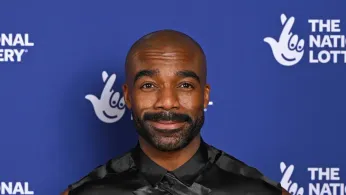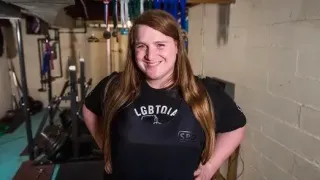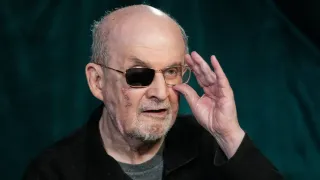
3 hours ago
Ore Oduba’s Brave Reveal: Breaking the Silence on Porn Addiction and Why Queer Communities Need to Talk About It
READ TIME: 4 MIN.
When Ore Oduba, beloved TV presenter and Strictly Come Dancing champion, dropped a truth bomb on the “We Need To Talk” podcast, the reverberations were felt far beyond Britain’s living rooms. Oduba shared that his porn addiction began at age nine, after a friend’s older brother showed him explicit material—a moment he described as “innocuous” but ultimately life-altering. “I know it had been dogging me, it had been destroying my life from the inside out,” Oduba confessed, revealing that the addiction became a way to cope with trauma and emotional pain throughout his youth and adulthood .
Oduba’s story isn't rare, but it is rarely told—especially by public figures who risk tabloid scrutiny and public misunderstanding. His decision to speak out was motivated by a desire to guide his own children and to “help others facing similar challenges,” recognizing that “an epidemic of problems for our young people” is already unfolding in the digital age .
Let’s be real: for many queer folks, Oduba’s story hits close to home. The “master masker” he describes—hiding his addiction, living “two lives”—echoes the experience of LGBTQ+ people who grow up concealing their identities, desires, and struggles. Oduba’s childhood fear of being discovered, and the belief that it would mean “life over as you know it,” mirrors the anxiety felt by countless queer youth confronting family pressures and cultural taboos .
That sense of isolation and shame—“It’s so shameful, we can’t talk about it, because there is a perceived nature to it that is everything that we hate, everything that we despise,” Oduba said—feels painfully familiar to anyone who’s lived in the closet or struggled with self-acceptance. The parallels between addiction and closeted queer experience are striking: both can be driven by a need to escape rejection, loneliness, or sadness, and both can foster secrecy and self-blame .
Oduba’s revelation comes at a time when conversations about sex, porn, and addiction are more urgent than ever. With 77 percent of Gen Z reportedly consuming porn and over 40 percent worried they watch too much, the line between recreation and compulsion is increasingly blurred . For queer youth, who often turn to online spaces to explore their sexuality, the risks and rewards are amplified: porn can be a source of affirmation and education, but also confusion, shame, or unhealthy patterns—especially when mainstream content doesn’t reflect diverse identities or healthy relationships.
Dr. Paula Hall, a sexual and relationship psychotherapist, explained that addiction is a continuum: “You know you’ve got a problem if porn is causing issues for you but in spite of those issues you can’t stop. It should be a choice, not something you feel compelled to do that’s causing problems in your life” . For LGBTQ+ people, whose sexual development is often shaped by secrecy and self-discovery in digital spaces, the potential for unhealthy coping mechanisms can be heightened.
Oduba’s openness is a breath of fresh air in a world that still treats addiction—and queer sexuality—with hushed tones and coded language. “I never imagined I would ever share this with anyone… The reason that I felt like I needed to speak about this is because I wanted to be able to guide my own children when it comes to them seeing stuff that is going to be there,” he said .
For LGBTQ+ communities, storytelling and honest dialogue have always been revolutionary acts. Whether it’s coming out, seeking help, or simply acknowledging that you’re not alone, vulnerability cracks open the door to empathy and change. Oduba’s courage challenges us to rethink shame, secrecy, and the power of naming our struggles—no matter what they look like.
What would it look like for queer communities to move beyond the “master masker” mentality—not just around sexuality, but mental health, addiction, and all the messy realities of being human? Oduba’s story invites us to demand safer, more inclusive conversations, where talking about porn, addiction, or trauma is met with curiosity and care rather than judgment or avoidance.
For LGBTQ+ readers who have navigated the labyrinth of secrecy, Oduba’s journey is a reminder that visibility and honesty can be transformative. If you’re struggling, you’re not alone—and help is out there. Organizations like Rehab Recovery and campaigns like For F*ck’s Sake (FFSProductions.com) offer confidential advice and support, with a recognition that everyone’s path to healing is unique .
As the UK government cracks down on aspects of the adult industry in the wake of growing concerns, the conversation about porn, pleasure, and addiction is shifting. This is a moment for queer communities to demand representation, nuanced discussion, and resources that reflect our realities—not just warnings or stigma .
Oduba’s story is more than a celebrity confession—it’s a rallying cry for compassion, dialogue, and radical honesty. In his own words, “Like any addiction, you have to live two lives, the one you're happy to show up in and the other you return to in order to feel anything, whether it's sadness or loneliness or depression or rejection or happiness, it becomes a friend” .
As queer people, we know the power of living openly, loving boldly, and rewriting the narratives we inherit. Ore Oduba’s journey reminds us: the only way out of shame is through it, together.






